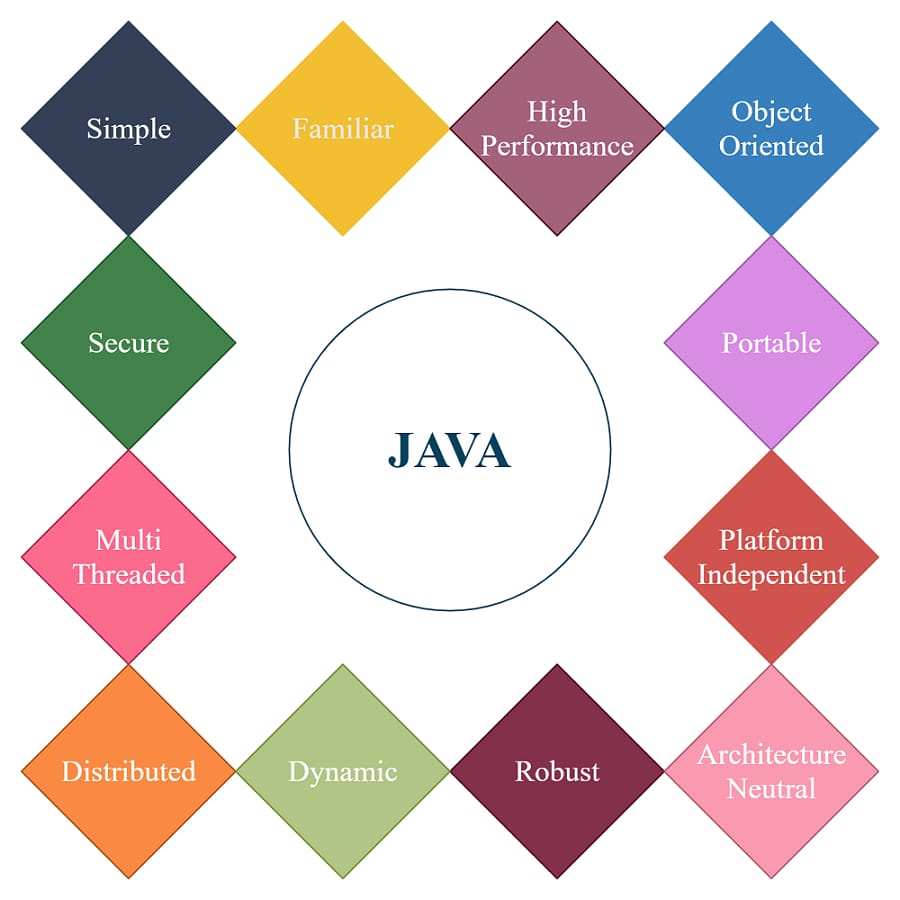In this tutorial, we will study the Features of Java and Keywords in Java programming like – Simplicity, Familiarity, Platform-Independent, Object-Oriented, etc with a brief discussion, and its different keywords.
Features of Java Programming
Simplicity
Java is a simple programming language compared to other programming languages like JavaScript, Ruby, or Perl. Java has a strong syntax which makes it consistent, easy to understand, and readable at the same time.
Familiarity
In the programming community, Java is basically the most familiar programming language compared to other programming languages. The concepts of programming in Java are similar to other programming languages like PHP, C#, Python, C++, etc. Java is commonly being used everywhere for programming purposes.
Platform-Independent
Java generates ‘bytecode’ after a program is compiled. This ‘bytecode’ is platform-independent in nature. It can be carried to any other operating system which supports JVM and executed without worrying much about the operating system.
Object-Oriented
Everything that is created in Java is in fact a collection of objects. Java uses objects to communicate with other objects and each other in a program. These objects require memory to operate. These objects are self-contained memory blocks in the main memory that contain runtime data. When not in use, these objects are destroyed by the Garbage collector (GC).
Robust
Java can be used to create robust software and applications. Java has strong error handling capabilities and memory management features that can be implemented to create error-free and memory-efficient software and applications.
Secure
Java is well known for its security features. Applications written in Java are highly encrypted and secured by Java. It also doesn’t support the use of pointers which are used in C/ C++. This is a huge benefit as it prevents direct access to memory.
Multithreaded
Java can make use of multiple threads to execute multiple tasks at the same time. Each thread can be seen as an individual execution path that can do a specific task without waiting for other tasks to complete. Threads can be created, destroyed, executed, and interrupted as needed by the developer.
Architecture Neutral
Programs compiled in Java are architecture-neutral in nature. These compiled programs or ‘bytecodes’ does not depend on the underlying architecture of the system. A system can run Java programs without considering its architecture until it has support for JVM.
High Performance
Java programs are compiled and executed with great performance. Instead of interpreting all the Java code each line at a time, Java bytecodes are interpreted and compiled by the JIT compiler at runtime. This makes Java fast and efficient.
Distributed
Java programs can be processed and executed in multiple environments. These environments can be distributed in different physical locations as well. These individual distributed components can be connected to each other to make them act as a single unit or a single system that can fulfill a task.
Dynamic
Java has the capability to allocate memory dynamically at runtime. Dynamic memory management and garbage collection are some of the most important features of Java. It also supports dynamic loading and linking.
Portable
Java bytecodes are platform-independent in nature, at the same time they are portable and lightweight. Bytecodes can be taken to some other machine with some other operating system that has JVM and then executed over there.
Learn What is Java
Keywords in Java Programming
There are several reversed keywords in Java. Each of these reserved keywords has a special meaning known to the Java compiler. These keywords should be placed in relevant places in any Java program. These keywords cannot be used as identifiers (variable names, method names, class names, etc). All these keywords should only be typed in lower-case letters.
| abstract | assert | boolean | break | byte |
| case | catch | char | class | continue |
| default | do | double | else | enum |
| extends | final | finally | float | for |
| if | implements | import | instanceof | int |
| interface | long | native | new | package |
| private | protected | public | return | short |
| static | strictfp | super | switch | synchronized |
| this | throw | throws | transient | try |
| void | volatile | while | const* | goto* |
* goto and const are not used anymore in Java.
